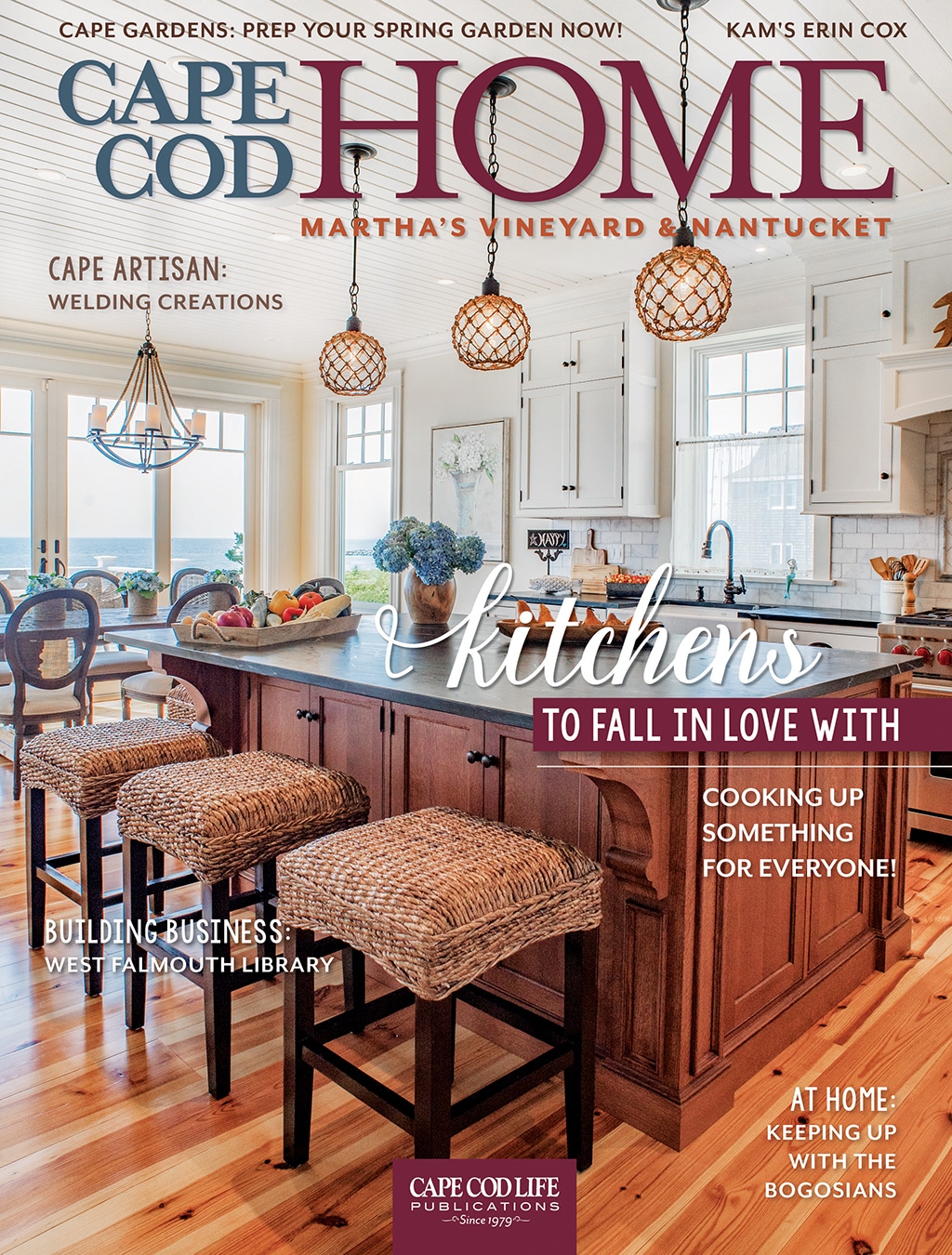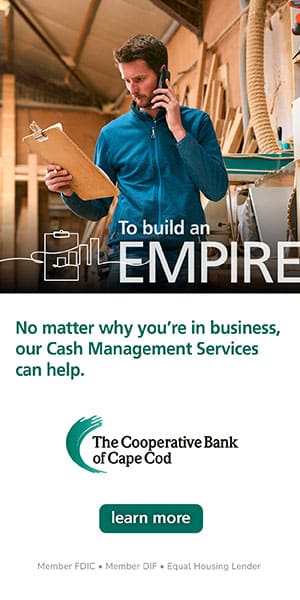
Next Wave: Erin Cox, KAM Appliances
Cape Cod Home / Autumn 2018 / Home, Garden & Design, People & Businesses
Writer: Haley Cote / Photographer: Teagan Anne
Next Wave: Erin Cox, KAM Appliances

Cape Cod Home / Autumn 2018 / Home, Garden & Design, People & Businesses
Writer: Haley Cote / Photographer: Teagan Anne

Erin Cox, business development manager for KAM Appliances
How many people can say they created the job they have? Erin Cox certainly can. After working in advertising and marketing on the Cape for over a decade at Cape Cod Broadcasting and Cape Cod Media Group, Cox, 36, decided to take her talents to the local home building industry, and approached KAM Appliances about being, what they would come to call, their business development manager. In her role, she consults with referral partners, acting as a conduit between their customers and KAM’s sales team. “I like at the end of the day knowing that my work is not only benefiting the company that I’m working for but also really helping the customer,” Cox says, “and in this position I’m able to help them through the entire process of their project.”
CCH: How do you approach a potential client, and get them to see the benefits of working with KAM?
EC: The biggest thing has been showing up and having that face-to-face contact. I will go to construction sites, walk into kitchen design showrooms, architects’ offices and talk to them about KAM. We just want an opportunity—an opportunity to show them the way we operate. A lot of contractors have been burned in the past working with the box stores, and the client is in a situation where it’s very difficult for them to get something serviced. Appliances are a commodity in that price is very important, but for our referral partners, what’s more important to them is the experience their customer is going to have with us from start to finish—and from start to finish means after the appliance is in their home and they’re using it, if anything comes up they know we’re going to back them up. They can call me seven days a week, so if they do have an issue, I’m getting that problem solved for them.
CCH: How has your background leading up to this position been an asset to you?
EC: It’s helped that I’ve always worked in relationship building and been in that liaison role, being that key point of contact for someone so they know that they have one person they can rely on to get the ball moving in any direction that’s needed. With a radio advertising campaign and a digital marketing campaign, it’s usually a year long. Building a house is about a year long too, so I’ve always been focused on staying in touch with customers while they’re in different phases of a project and following up with them when the time is right.
CCH: You mentioned relationship building—would you say this is the key to your success?
EC: It definitely is. KAM has had relationships with contractors for the last 40 years, so this is another investment in those relationships and giving them that additional key point of contact to follow things all the way through. So they’ve always had those relationships, it’s about deepening them and carrying them forward into the future.
CCH: What advice would you give fellow young professionals looking to succeed here on the Cape?
EC: Get involved—get involved in the community, get involved in what’s going on around you. It’s really easy to sit at home and think there’s nothing going on here, but if you scratch the surface and get out there—get to your chamber events, get involved in a nonprofit organization, get involved in a club—you’ll find there’s so much you can benefit from. And get a mentor. Bob Viamari from Cape & Plymouth Business Magazine has been my mentor for my entire career. There’s a lot of talent on the Cape, in particular with people that have been here for a while, and I think that there are so many people that are willing to help and want young professionals to thrive on the Cape.
CCH: What’s the most important thing you’ve learned from your mentor, Bob Viamari?
EC: One thing that he’s talked to me about is that there are a lot of people who have good ideas, but it’s all about the execution. It’s about backing up your words and following through with what you say you’re going to do. When I was in management, he really taught me a lot about being a servant leader and how you’re there to serve your team and jump in and help them with anything they need anytime. He really practices what he preaches. I’m not the only person that he’s reached out to in terms of helping them along the way in their career on the Cape—there are so many people that I know of that he has had a similar relationship with, and that’s just the kind of person that he is.
CCH: Have you noticed any trends lately as far as appliances?
EC: Induction, for one. Europe has really adopted induction. Here it’s still relatively new, and it’s been expensive, so it’s been out of reach for a lot of consumers, but it’s coming to the mass market. Frigid Air has an induction range for $999, so they’re making it more accessible to the middle market, and that’s getting people excited about it. It’s a really great alternative to electric. With electric, when you turn the element down from high to low, the surface is still so hot it takes time for it to actually cool down, so you can burn things very easily. Whereas with induction, it goes right down immediately, so it’s more precise cooking. The other trend is the connected kitchen. There are a lot of appliances now that are WiFi-enabled, so you can preheat your oven before you get home, you can run your dishwasher, you can see how long a roast has to cook because oftentimes there’s a wireless temperature probe you can put inside the meat. So say you have Thanksgiving guests and you’re outside enjoying their company, you’d be able to, without having to go into the oven and check that yourself, see how long you have left to cook. Those are all the shiny and new features, but I think the biggest benefit is that a lot of times, when there’s a WiFi-connected appliance, the manufacturer can remotely diagnose the issue. It’s less time, it’s less money for the consumer, and they get the issue fixed quickly.
CCH: What’s been your biggest takeaway thus far from working in the building industry?
EC: I have learned a lot, and I think I underestimated, coming into the appliance industry, just how much there is to know. The best comparison I can make is that it’s like if you had a car dealership, and you had every single manufacturer and brand of car, and you had to know the differences and benefits and features of every single model within each brand. You picture that with all of the microwaves, dishwashers, laundries, refrigerators and range cooktops and wall ovens, and there are literally thousands of different product choices for each one of those components. And our sales professionals have to be in tune with the specific details, features and benefits of all of those different models. To have somebody that has that level of expertise and knowledge, and is constantly receiving training, on their side with the selection process is vital. Especially when someone’s building a home, they can get decision fatigue—they have to make selections for everything—so having somebody to walk them through can’t be underestimated. And then I’ve also learned about the timelines it takes to build a home, and going to construction sites all the time I’m seeing things in different phases of the process. There’s so much more to learn. I think about architects and how we know about all of the appliances, they have to know, in a general way, about every single component that goes into a home and help a client make specific selections for those products. That’s mind-blowing to me.
CCH: What’s your take on the future of the building industry here on the Cape?
EC: What I see on the Cape that I don’t necessarily see as much on the South Shore is builders and contractors marketing themselves, and I think they’re going to have to continue to do that because so many of the homebuyers that are going to be hiring them are going to be hiring them from afar. So it’s going to become even more important for them to stay connected with those customers that they’re doing projects for off-Cape and be found by them if they want to grow.
CCH: How do you enjoy your time outside of work?
EC: Really what we (she and husband Patrick) like to do is spend time together, whether that’s around the wood stove in the wintertime or with friends. We’re not really big on going out a lot; we’re more like homebodies. We do like to travel—we got married in Ireland and we’ve been back there a few times since. Both of my grandparents are Irish immigrants, and I’m now a dual citizen. I like to exercise too. I’ve just gotten back into rowing, which is what I did in high school. But my hobby right now is discovering new things to do with our son (2-year-old Grady) as he progresses—discovering the Children’s Museum and going to Heritage Museums and Gardens with him. Discovering those things is part of me moving into this new role of being a mother and figuring out what he likes.



